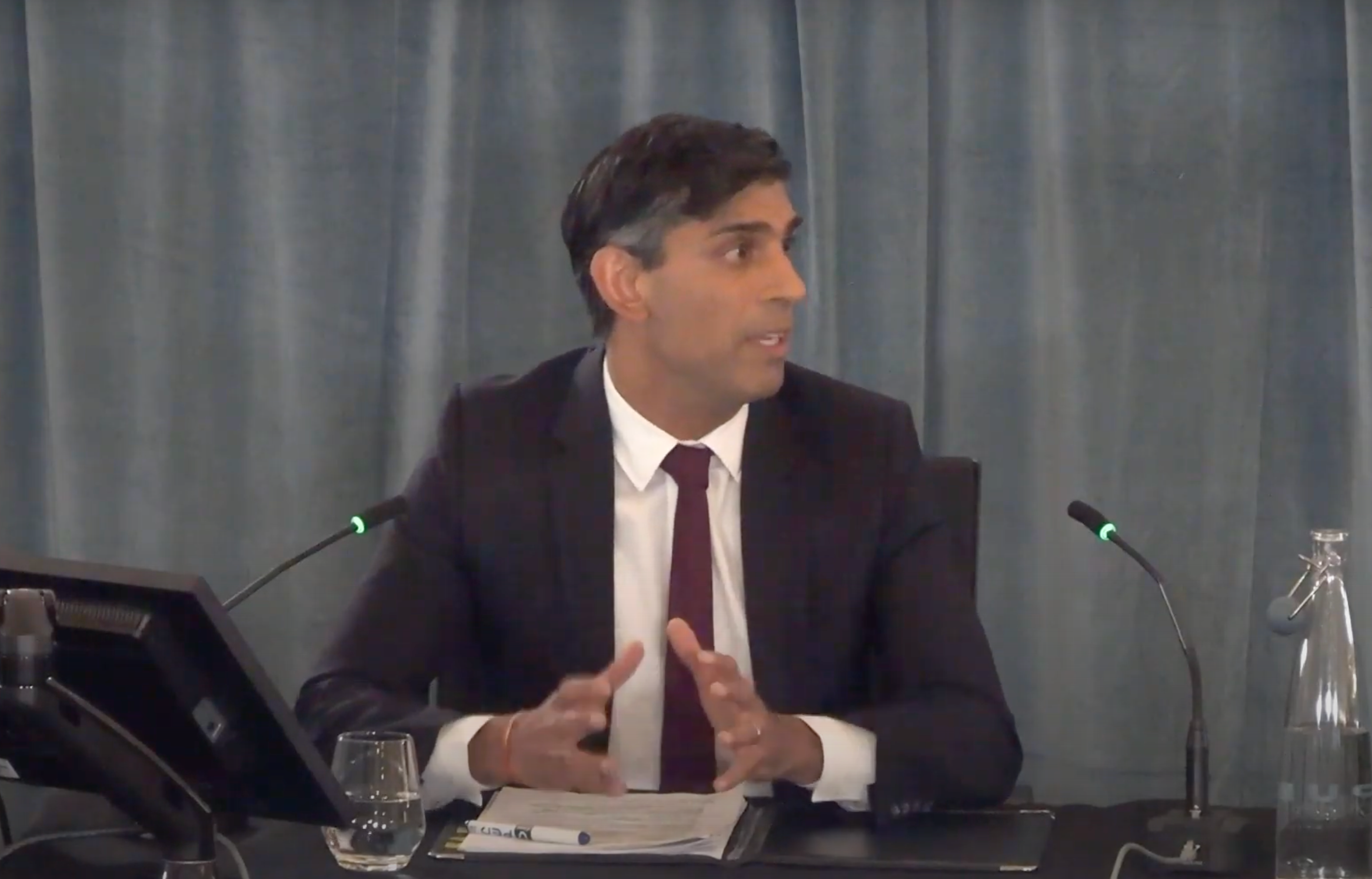Rishi Sunak heckled as he defends government’s contaminated blood scandal response
Prime minister faces laughter and groans at public inquiry

Rishi Sunak faced heckling and mockery from members of the public on Wednesday as he defended the government's handling of the contaminated blood scandal.
The prime minister faced groans and laughter from members of the audience as he was questioned at a public inquiry over delays in setting up a compensation scheme for victims.
Mr Sunak told the Infected Blood Inquiry that he would pay compensation to victims of the “appalling” scandal “as swiftly as possible”.
Thousands of people died and others continue to suffer after being given contaminated blood products in the 1970s and 1980s.
The scandal is widely recognised as the worst treatment disaster in the history of the National Health Service.
Victims and their families have criticised the speed of the government’s response and delays in compensation payments.
Mr Sunak used his appearance at the inquiry to defend the decision to wait for the inquiry’s final report before confirming a full compensation plan for victims.
But his evidence to the inquiry was met with laughter from some of those listening.
“The government is conducting an extensive amount of cross-government work to analyse all the various questions and recommendations posed in the interim reports so that government is in a position to act as quickly as possible after receiving the final report, and that work continues at pace,” he said.
As he spoke, laughter could be heard coming from people watching in the room.
When asked why no information about a “concrete compensation framework” had been produced by the government, Mr Sunak said:
“I think what I’d say is, of course, people want to see... What I’d say is, in order for the government to make decisions on compensation, it rightly has asked an independent inquiry to conclude its work to provide the advice to government and recommendations about what to do.”
The audience groaned as Mr Sunak gave his answer. Over four thousand people had been paid interim compensation payments already, he said.
Mr Sunak denied that the inquiry was an “excuse” for delaying compensation payments, stating: “Of course, it’s not an excuse,” adding that “government would typically wait for an inquiry to conclude”.
Mr Sunak also told the inquiry: “This appalling scandal has gone on for decades. People have been let down for decades by successive governments.
“I think over a succession of not just years but decades justice has been denied to people. They haven’t received the recognition that they need and deserve.”
Sir Brian Langstaff, chair of the inquiry, told those watching Rishi Sunak giving evidence that there was a tradition of “respecting the witness”.
“Can I just remind everyone, I know the evidence is emotive to many of you but we do have a tradition of respecting a witness to make it easier for them to say what they want to say, please,” he said.
In his summing up at the end of the day’s proceedings, Sir Brian won a vigorous round of applause from the inquiry’s audience when he urged Mr Sunak to provide “further tangible recognition” that the government was working to resolve the matter of compensation for victims and their families.
“If there is anything that you can, in the interim do to reassure them, preferably by actions rather than by words, but either will do – actions preferably – that there will be the compensation, which is just and fair and it will be delivered as soon as possible,” he said.
“Because if it troubles my conscience, I would think it would trouble the conscience of a caring government. And you have said that’s what you would wish to be.”
Des Collins, senior partner at Collins Solicitors, representing over 1,500 victims of the scandal, says: “My clients will be pleased to hear that the PM recognises the extent of the harm caused to the infected and affected over decades and that he doesn’t intend for his government to add to previous governments’ broken promises.
“However there’s still no indication on the issue that matters to them most – swift redress. It’s not good enough just to be visibly moved by the victims’ testimonies, Mr Sunak must act now and not wait until publication of Langstaff’s final report, as he promised he was willing to do when he sought the office of PM last summer.
“We hope that the PM leaves the Inquiry today with a deeper sense of personal investment in bringing justice to all those who have waited so long to receive it.”
Join our commenting forum
Join thought-provoking conversations, follow other Independent readers and see their replies
Comments
Bookmark popover
Removed from bookmarks